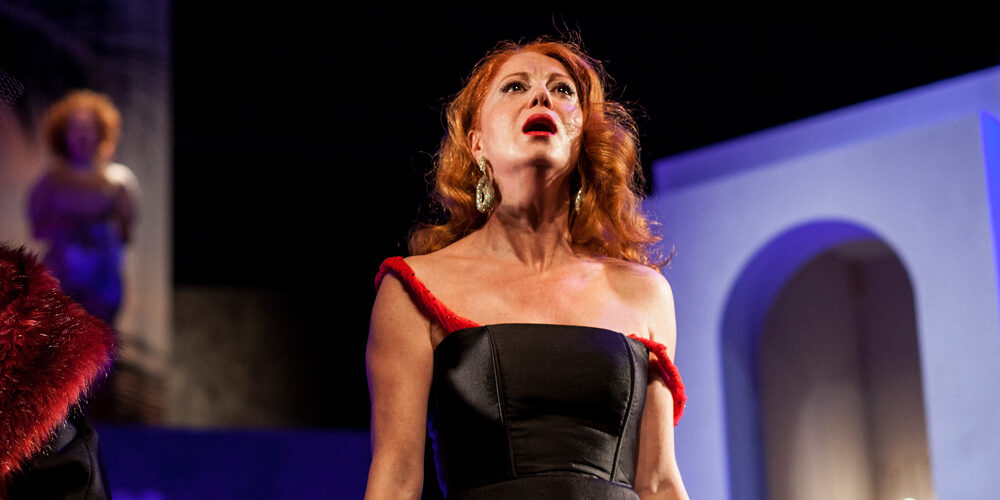Atelje 212, Belgrade, premiere 1st March 2024
The spring season at Atelje 212 got underaway with a fresh, funny, and cathartic new play. Directed by Ivan Vuković, Fear in the Opera, by Jelena Mijović ,is based on the motives from the stories of Dino Buzzati (Saints, Egg, Fear in the Scala, Girl Who Fails) and melds elements of absurdity, comedy, satire and cabaret, with biblical mythology. After Address to the Nation by Ascanio Celestini, Atelje 212 once again uses Italian source material as an analogy for our society. The world of the play is absurd and comic but under all the sparkle, it is very dark. However, unlike the cynical and cruel world presented in Address 0to the Nation, here decoded biblical motifs shine a light on this world.
On the night of the premiere in the Opera House, on Saint Marcolino’s Day, the audience are presented with scenes from the Bible. However, in the theatre, a class conflict starts between the city elite – the mayor’s wife (Jelena Đokić) and the director of the opera, on one side – and Đilda, a cleaning lady who protects her teenage daughter, Antonela, who has been falsely accused of stealing eggs from the mayor’s daughter. At the same time, Saint Gancilo, who has just become a saint, goes through an existential crisis, questioning the purpose of being a saint, while Saint Marcolino advises him to accept the corruption that comes with the position of a saint.
In the meantime, a revolution in the city makes the opera house director and the mayor’s wife afraid of losing their privileges, but, luckily for them, the revolution fades away and they remain in power, enjoying the view of depressive girls committing suicide by jumping from a skyscraper. That is, until the end, when the mayor’s daughter (Suzana Lukić) becomes the one to jump, driven mad by her mother’s pressure to become an opera singer, even though she doesn’t sing well or even want to sing at all. Saint Gancilo saves her life only to lose his status as a saint as a consequence.
The saints in this play often say that the streaming of the slaughter of Bethlehem’s children is on the TV and that they have to watch it all the time since God demanded that. This slaughter, a reference to an event from the Bible, could also be an analogy for the slaughter happening in Ukraine and Gaza, or closer to home, the mass shootings that took place in the Ribnikar Primary School and Dubona and Malo Orašje that happened last May in Serbia. We are reminded every day of this tragedy and we can’t do anything to change it nor do we understand the reasons why it happened.
There are further parallels. The protesters are on the street, both in Belgrade and in the play and the director of the opera house, like the powerful people in the Serbian theatre world, are afraid of losing power if the elections bring a change in the system.
The play shows actors to be either untalented people who became popular only through nepotism, or talented people who never had a chance because of their financial circumstances. In this way the play interrogates the idea of talent itself, showing how we do not all have the same start from which we can make a career or become a celebrated artist.
The acting is very strong. As Ignacia, the mayor’s untalented daughter, Suzana Lukić plays a young woman pressured by her mother to become an opera star, even though she can’t sing. In her character, Mijović explores the tragedy of children who were raised to please their parents’ needs for grandiosity. Lukić explores all the flaws and contradictions of her character, someone who is naïve, but can sometimes be as cruel as her mother, her ugliness emerging through comedy. At the same time, she embodies her pain with the seriousness of a neglected, sad girl whom nobody believes is sad, just like Britany Murphy’s troubled character in Girl, interrupted.
Đokić gives a standout performance as the narcissistic mother, a woman who regularly cheats on her husband and manipulates all the other characters, while clad in a beautiful black dress (costumes by Velimirka Damjanović). She manages to be completely disgusting, seductive and attractive all at the same time. However, in the end, she conveys the underlying tragedy in a woman who remains in denial that her daughter is committing suicide, even as she is watching her fall.

Fear in the Opera, Atelje212
Luka Grbić excels as a kind, naïve boy with a good heart. He emphasized this naivety with his childish approach to Saint Marcolino, asking him a lot of questions with a child’s curiosity. Svetlana Bojković is convincing and funny as Đilda, a working-class woman who becomes a revolutionary leader, leading the masses with a toilet brush.
Andreja Rondović’s scenography is breath-taking, yet simple – with pillars above the ground, surrounded by clouds, representing the court of the saints, like an Italian renaissance scene, surrounded by pillars, with a painted backdrop showing us the theatre and the city. There is also a toilet where Đilda and her daughter have their intimate mother-and-daughter moments.
When, in the end, Saint Gancilo losing the status of sainthood, it doesn’t matter, because he has found his purpose in solidarity and empathy. He is has found a community with Đilda and her daughter, who feed him with soup. The last words of a show are his: “The smoke from this holy pot – now I know that it’s a God.” The real miracle exists in the solidarity between people. There are no gods, only food, home, and peace for everybody -people helping each other in a community.
This show is dedicated to theatre workers, especially those people who are often ‘invisible’ – the cleaning staff, the prompters, the technicians, the critics, the dramaturgs – the dramaturgy book of the play itself is even used in one scene, referred to as a libretto for this opera we are watching. It’s a subtle way to make the audience pay attention to the meaning and message that the writers, directors, and dramaturgs want to deliver. In the book. Mijović explicitly states that she supports organizations including Solidarity Kitchen and United Action Roof Over Our Heads, that support and assist those in need, cooking food for the homeless and defending people from losing their homes.
It’s one more political element in a play that is strongly political and powerfully delivered, using a veil of a Christian mystery to speak very clearly, to anyone who listens, about the place we are in today.
Credits:
Director: Ivan Vuković//Text by: Jelena Mijović, based on the motifs from the stories of Dino Buzzati//Dramaturgy: Isidora Milosavljević//Scenography: Andreja Rondović//Costumes: Velimirka Damjanović//Composer: Irena Popović//Organizer: Boško Radonjić// Director’s assistant: Anđela Krunić//Light design: Marko Đokić// Sound design: Draga Stevanović Bagzi
For tickets and further information, visit: Atelje212.rs
Mina Milošević is a playwright, dramaturg, screenwriter, and theoretician based in Belgrade. She holds a BA in Dramaturgy and an MA in Theory of Drama Arts at the Faculty of Dramatic Arts in Belgrade. She worked as a dramaturg on plays in Atelje 212, Belgrade Drama Theatre, Yugoslav Drama Theatre, National Theatre in Belgrade, and Oda Theatre in Prishtina. Her play "Dr Ausländer (Made for Germany)" was presented at BITEF festival 2022. Her master's thesis on female friendship in Serbian contemporary theatre won the "Professor Boško Milin" Award.








